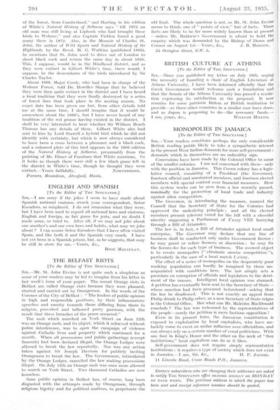MONOPOLIES IN JAMAICA
[To the Editor of THE SPECTATOR.]
Sin,—Your readers constitute perhaps the only considerable British reading public likely to take a sympathetic interest in the present West Indian demands for more self-government demands which in themselves are no unhealthy sign.
Concessions have been made by the Colonial Office to some of the smaller colonies. I am not concerned with these—only with the position in Jamaica. This Crown colony has a legis- lative council, consisting of a President (the Governor), fourteen official and nominated members, and fourteen elected members with special control over financial measures. How this system works can be seen from a law recently passed, nominally for the protection of local trade and industry against alien competition.
The Governor, in introducing the measure, assured the Council that the Secretary of State for the Colonies had approved the underlying principle ; and all the elected members present (eleven) voted for the bill with a cheerful alacrity suggesting a Parliament of Peary VIII hurrying through a Bill of Attainder.
The law is, in fact, a Bill of Attainder against local small enterprise. The Governor may declare that any line of business shall be conducted only under Government licence ; he may grant or refuse licences at discretion ; he may fix the licence-fee for each type of business. The avowed object is to create monopolies (" eliminate unwise competition "), particularly in the case of a local match f..ctory.
The effect of a series of monopolies on the desperately poor working population can hardly be imagined by those un- acquainted with conditions here. The law simply sets a premium on corruption of officials and legislators to the detri- ment of the masses. Intelligent local opinion was stunned: A petition has eventually been sent to the Secretary of State— whose sanction had been procured beforehand—asking that the law be disallowed. This is not exactly an appeal from Philip drunk to Philip sober, as a new Secretary of State reigns in the Colonial Office, But what can Mr. Malcolm MacDonald conclude ? The law was welcomed by the representatives of the people—surely the petition is mere factious opposition Even in its present form, the Jamaican constitution is exposed to exploitation by local capitalists, who have un- luckily come to exert an undue influence over officialdom, and can always rely on a certain number of venal politicians. With one foot in King's House and the other on the neck of " free institutions," local capitalism can do as it likes.
Self-government does not require simply representative institutions : it requires a type of society which does not exist


































 Previous page
Previous page